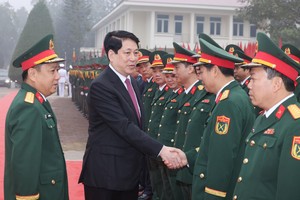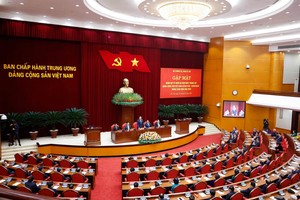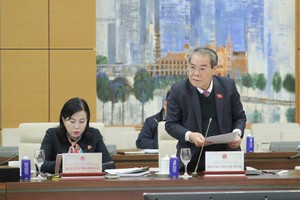
KPIs helps to improve job responsibility
As the largest enterprise in the construction materials sector in Lam Dong province and its neighboring areas, Lam Dong Minerals and Construction Materials Joint Stock Company has implemented KPI-based evaluations for approximately 800 employees. This approach has helped the company maintain operational efficiency across a broad geographic area.
According to General Director Le Cao Quang, employees are assessed using key indicators such as revenue generation and task-specific performance. This system ensures consistent productivity, fosters a strong sense of responsibility among staff, and sustains an average monthly income of around VND13 million. KPI evaluations also play a crucial role in personnel management, salary structuring, and bonus distribution.
Since early 2025, the company has incorporated digital transformation into its KPI assessment process by deploying performance-tracking software. This upgrade has reduced time spent on evaluations, increased accuracy, and enabled seamless data reuse over time.
General Director Le Cao Quang added, "For the state sector, applying KPIs to evaluate public officials and civil servants will be even more advantageous, as the legal framework and clearly defined job structures can support more effective implementation and improved performance".
Director Doan Huu Hau of Digital Transformation and AI Application Services at FPT Digital highlighted that many organizations develop KPIs intended for long-term use that may not align closely with the actual tasks and responsibilities of individuals or units. This misalignment is a critical factor to consider when implementing KPIs. He emphasized that, beyond procedural measurement, KPIs also play a valuable role in driving individual progress.
In today’s challenging market environment, businesses increasingly recognize the importance of lean management to address external risks and bolster internal capabilities.
At Secoin Joint Stock Company, which employs nearly 1,000 people, job performance evaluations are based on detailed job descriptions and workflows. Company’s General Director Vo Thi Lien Huong explained that analyzing work processes allows them to identify steps that can be eliminated, revealing potential savings in time and costs, even for small, intricate tasks.
KPIs are applicable in the public sector
Lecturer Nguyen Tran Nhu Khue, Head of the Law Department of the Ho Chi Minh City Academy of Officials commented that applying KPI to the public sector is necessary in the current new situation, despite many difficulties and challenges.
Applying KPIs in the public sector is far more complex than in the private sector, where productivity is often easily measured by revenue or output. In the public sector, many roles lack precise quantification, and state administrative management often involves problem-solving for citizens that may not be captured within KPI metrics. Additionally, certain professions have unique characteristics and no tangible products, making the application of KPI a mere formality in some cases.
Lecturer Nguyen Tran Nhu Khue emphasizes the need for a careful, transparent, and specific approach when implementing KPIs in public administration, cautioning against a superficial application. Rather than relying solely on KPI indicators to assess the performance of cadres and civil servants, evaluations should also consider their responsibility, ethics, and true contributions in executing their duties.
To ensure KPIs are effectively applied, they must align with the nature of each job. This requires first establishing a comprehensive job description framework—one that is clear, detailed, flexible, and adaptable, particularly for roles with unique characteristics within the public sector.
Lecturer Nguyen Nhat Khanh at the University of Economics and Law (Ho Chi Minh City National University) noted that applying KPIs in the public sector can be challenging due to the qualitative nature of public service tasks, making it difficult to establish suitable measurement indicators. Poorly designed KPIs may lead civil servants and public employees to prioritize superficial targets, undermining the objectives of public service.
For effective KPI implementation in the public sector, comprehensive preparation is essential, including robust institutional frameworks, skilled human resources, reliable databases, advanced information technology, and a shift in management mindset from traditional administration to public administration, the lecturer added.
Former Deputy Minister of Internal Affairs Nguyen Tien Dinh expressed his opinion that when KPIs are applied, how to describe the work in detail for evaluation is also a problem. In the public sector, there are tasks that are carried out according to time schedules and cannot be completed immediately. Accordingly, civil servants can be assessed based on their work progress over specific timeframes, such as six months or one year, as well as in relation to their respective job positions.
When applying KPIs to the evaluation of public officials and civil servants, it is also necessary to establish a mechanism of accountability for the heads of agencies and units to ensure objectivity and fairness in the evaluation process. Former Deputy Minister of Internal Affairs Nguyen Tien Dinh agreed, stating that public officials and civil servants should base their self-assessments on KPI criteria, after which the leaders of the agencies or units will continue the evaluation based on the job position.
Public officials and civil servants must understand how their job position aligns with the assigned workload over a certain period and report their progress to their agency or organization. In this process, the person assigning the tasks must also demonstrate a strong sense of responsibility, fairness, and thorough understanding of the work in order to objectively assess their public officials and civil servants.
The Ministry of Home Affairs will utilize artificial intelligence (AI) technology to compile and analyze data from various countries in order to develop key performance indicators. It is expected that the ministry will establish a general evaluation framework at the central level, which will then be further detailed by individual units to suit the specific characteristics of each sector and job position.
Additionally, information technology and specialized software will be used to support the evaluation process, enhancing transparency and objectivity. At the same time, responsibilities will be clearly defined, granting authority to unit leaders to assign tasks, monitor, assess, and provide feedback on the performance of public officials.
























